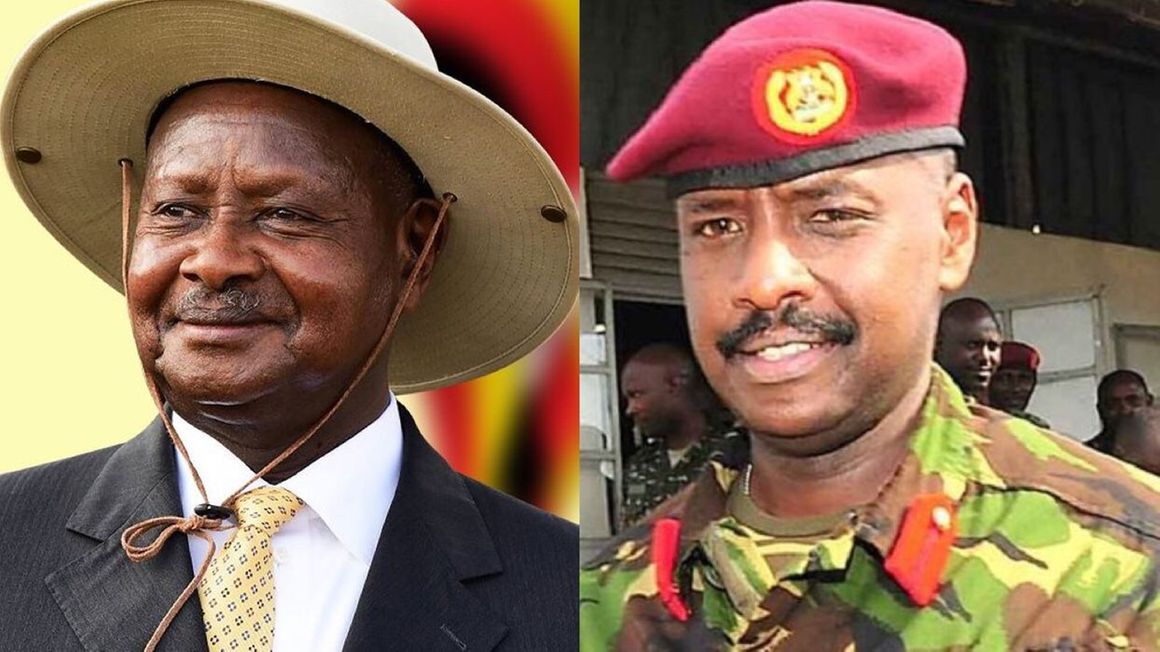
Ugandan President Yoweri Museveni and his son Gen. Muhoozi Kainerugaba. PHOTO | COURTESY
Uganda is easily, as a friend puts it, the most ‘annoyingly interesting’ country in the
region. That is no simple feat in this neighbourhood which now includes Democratic Republic of Congo. There is madness, mayhem and a lot of colour. The question of succession politics is one of those issues which consistently make headlines regardless of whether the country has just concluded a round of ‘competitive’ elections or not, it is always there on the surface. It also does not matter whether the country in question has a single dominant political party in power, constantly changing political alliances or a hybrid political climate of politico-military alliance in charge.For nearly a decade, headlines about post-Museveni’s Uganda, have linked him with efforts of establishing dynastic politics by putting plans in place to ensure his son, Gen Muhoozi Kainerugaba, inherits the presidency. Muhoozi’s 48 birthday bash was not seen by some commentators as celebrating the past but further evidence of the continued efforts of propelling him to the presidency after his father. His request to retire from the army and his latest efforts for rapprochement between Uganda and Rwanda have all but amplified this view.
President Museveni’s denials of preparing his son for the presidency nor Gen Muhoozi’s claims that he is not interested in the presidency have not assured those with suspicions about what happens next after Museveni vacates the political stage.
Africa has a complicated and varied relationship with sons succeeding their fathers when it comes to the presidency. In some countries, courtesy of time lag or other political factors, sons ending up residents in state house did not exactly cause any political earthquakes. Kenya and Zanzibar saw two sons of former presidents ending up with their fathers’ previous job.
In other countries, like Gabon and Togo, or the DRC, the proximity between fathers and sons succession did not settle well for some. In some cases, elections were held to legitimise the succession of sons from their fathers. In Chad, that has not happened as the country continues to face security challenges leaving those in charge of the country with more other pressing matters than squabbling about who runs the country.
In Hosni Mubarak’s Egypt and Muammar Gaddafi’s Libya, the rumours of them preparing to hand over their thrones to their sons did not come to pass. In Equatorial Guinea, the same stories have circulated about who comes after the long time ruler exits the stage, with his flamboyant son leading the proverbial queue to succeed his him.
Political successions are tricky things in an African setting regardless of what constitutions in a given country stipulates.
Those who seem closest to the throne can, in reality, find themselves beyond even the wildest shot at the top job, which might end up being occupied with completely new political characters who had no chance in whatever scenario drawn up except the craziest or strangest ones.
When it comes to the issue of fathers and sons, the nature of the father’s rule have a lot of bearing on how dynastic politics is viewed on the continent. Many rulers have parochial view on many things and the circle of trusted individuals rarely goes beyond those from their own region or ethnic group. As such, opponents of any attempts of sons succeeding their fathers might be making the case against it for very personal reasons which have little to do with democracy.
Those in favour of such projects have the same reasons as those opposing it, except it is on the extreme opposite where dynastic succession assures them and their interests will continue to be taken care of by the powers that be.
There is little debate about the merits of the sons for the top job.
Museveni, if he really plans to leave the presidency to his son, could do a Joseph Kabila with his succession by circumventing his opponents who are focused on what is happening now. Kabila preferred successor lost the election but the eventual winner, a candidate from the opposition was not the one those opposed to him expected to win. In Uganda’s case, there is a lot of speculation about what role another political character in former prime minister Amama Mbabazi would play in a post-Museveni Uganda.
Father to son projects have not been particularly successful or popular on the continent, and even much less in the region. It could all beautifully come together or spectacularly explode. In this fog of succession politics, there is only one constituency to look at and their interests in succession politics: the military.


No comments:
Post a Comment